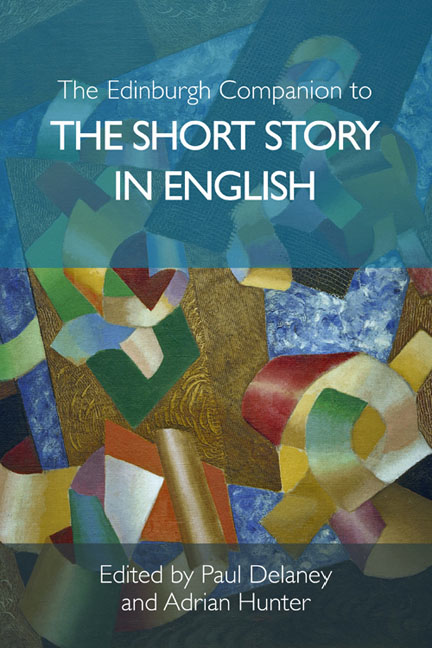Book contents
- Frontmatter
- Contents
- Acknowledgements
- Notes on Contributors
- Introduction
- Part I Historicising the Short Story
- Part II Publishing the Short Story
- Part III Forms of the Short Story
- Part IV Placing the Short Story
- Part V Identity and the Short Story
- 18 Gender and Genre in the Short Story
- 19 Diaspora and the Short Story
- 20 The Queer Short Story
- 21 Disability and the Short Story
- Index of Short Story Titles
- General Index
19 - Diaspora and the Short Story
from Part V - Identity and the Short Story
Published online by Cambridge University Press: 18 December 2019
- Frontmatter
- Contents
- Acknowledgements
- Notes on Contributors
- Introduction
- Part I Historicising the Short Story
- Part II Publishing the Short Story
- Part III Forms of the Short Story
- Part IV Placing the Short Story
- Part V Identity and the Short Story
- 18 Gender and Genre in the Short Story
- 19 Diaspora and the Short Story
- 20 The Queer Short Story
- 21 Disability and the Short Story
- Index of Short Story Titles
- General Index
Summary
‘IDENTITY IS NOT AS transparent or as unproblematic as we think’, Stuart Hall remarked some years ago, in an influential intervention on the history of Caribbean migration and the evolution of black British culture. ‘Perhaps instead of thinking of identity as an already accomplished fact, we should think, instead, of identity as a “production”, which is never complete, always in process, and always constituted within, not outside, representation.’ Hall's comments were part of a larger discussion about the need for new concepts or modalties to be formed in order to make sense of the lived realities of identity formation – in particular, expressions of cultural identity – in the latter decades of the twentieth century. The crucial thing, Hall noted, was the need to break from essentialist definitions which are ahistorical, predetermined and the preserve of a select group or community of people. Cultural identity ‘is not a once-and-for-all’ and ‘it is not a fixed origin to which we can make some final and absolute Return’. Rather, Hall stressed the need to move towards more expansive and potentially unsettling ways of thinking about identity as a practice that is always undergoing transformation, that is responsive to an array of influences, and that bears witness to the continuing legacies of colonialism, economic exploitation and slavery in the contemporary world. Cultural identities are constructed in and through history, Hall observed, and are dependent upon the selective use of memory, myth, narrative and other representative strategies for meaning.
A key concept in this discussion was ‘diaspora’, as a number of commentators on both sides of the Atlantic (including Hall) explored the potential for this term to be revised and extended to speak to the complex and frequently traumatic experiences of different groups of people throughout history. ‘If it can be stripped of its authoritarian associations’, Paul Gilroy suggested in dialogue with Hall, and shorn of its biblical connotations (the chosen people who are dispersed in the Book of Deuteronomy but who are also promised a future and a divinely sanctioned homecoming, ‘the Diaspora’), the term ‘may offer a seed capable of bearing fruit in struggles to comprehend the novel sociality of a new millennium’.
- Type
- Chapter
- Information
- The Edinburgh Companion to the Short Story in English , pp. 313 - 327Publisher: Edinburgh University PressPrint publication year: 2018



